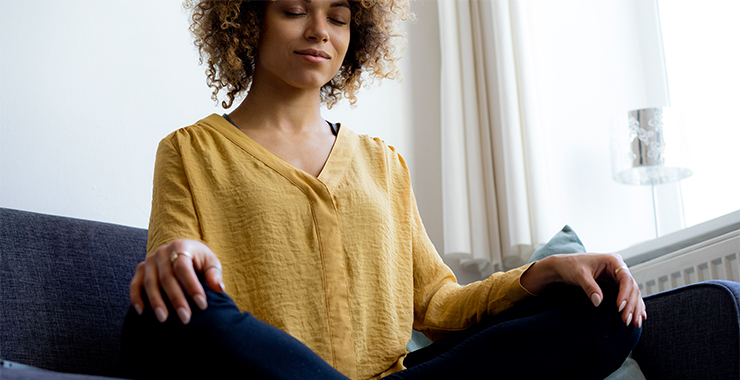
Stress is the body’s reaction to harmful situations — whether they’re real or perceived. When you feel threatened, a chemical reaction occurs in your body that allows you to act in a way to prevent injury. This reaction is known as “fight-or-flight,” or the stress response. During stress response, your heart rate increases, breathing quickens, muscles tighten, and blood pressure rises. You’ve gotten ready to act. It is how your brain and body work together to protect you.
Our bodies are designed to handle small doses of stress. But, we are not equipped to handle long-term, chronic stress without ill consequences. 70% of adults in the US say they experience chronic stress or anxiety daily.
Click here to learn about stress and its warning signs.
Here are 10 simple ways to relieve stress and anxiety naturally.
Mindfulness Meditation
Surprise! Mindfulness meditation is the #1 best way to relieve stress – and I’m not just saying that because I teach it. Only meditation can be done anytime, anywhere – even in the moment stress arises – and it has a cumulative, positive effect. That’s the beauty of it.
Think of the practice of meditation like being at a gym for our minds; we are literally strengthening our minds to not let every discursive thought control our lives and how we feel. It’s as simple as that.
Of the many benefits of meditation, one that helps cut stress before it happens is we can see the world in a fresh way. We can see what is actually happening vs. letting our very creative minds lead us to believe something erroneous.
You know what I’m talking about. You’ve been there.
Get thee to an authentic mindfulness meditation program and put your valuable energy into practicing it in your daily life. You’ll be glad you did. I was.
Deep Breathing
During the stress reaction, deep breathing exercises can help activate your parasympathetic nervous system, which controls the relaxation response.
There are several types of deep breathing exercises, including diaphragmatic breathing, abdominal breathing, belly breathing and paced respiration.
The goal of deep breathing is to focus your awareness on your breath, making it slower and deeper. When you breathe in deeply through your nose, your lungs fully expand and your belly rises.
This helps slow your heart rate, allowing you to feel more peaceful.
This video explains how to practice diaphragmatic breathing.
Get Out in Nature
Lucky we live Hawaiʻi – nature is everywhere!
A stroll outside on a sunny day is a great pick-me-up. Nowadays, it may also be just what the doctor orders.
The benefits of nature for both body and mind are finding their way to the prescription pad as more health care providers are telling their patients to take a hike – literally.
Take a Yoga Class
Yoga has become a popular method of stress relief and exercise among all age groups.
While yoga styles differ, most share a common goal — to join your body and mind.
Yoga primarily does this by increasing body and breath awareness.
Some studies have examined yoga’s effect on mental health. Overall, research has found that yoga can enhance mood and may even be as effective as antidepressant drugs at treating depression and anxiety.
In general, the benefit of yoga for stress and anxiety seems to be related to its effect on your nervous system and stress response.
It may help lower cortisol levels, blood pressure and heart rate and increase gamma-aminobutyric acid (GABA), a neurotransmitter that is lowered in mood disorders.
Exercise
It might seem contradictory, but putting physical stress on your body through exercise can relieve mental stress.
The benefits are strongest when you exercise regularly:
- Stress hormones: Exercise lowers your body’s stress hormones — such as cortisol — in the long run. It also helps release endorphins, which are chemicals that improve your mood and act as natural painkillers.
- Sleep: Exercise can also improve your sleep quality, which can be negatively affected by stress and anxiety.
- Confidence: When you exercise regularly, you may feel more competent and confident in your body, which in turn promotes mental wellbeing.
Try to find an exercise routine or activity you enjoy, such as walking, dancing, rock climbing or yoga.
Activities — such as walking or jogging — that involve repetitive movements of large muscle groups can be particularly stress relieving.
Write It Down
One way to handle stress is to write things down.
While recording what you’re stressed about is one approach, another is jotting down what you’re grateful for.
Gratitude may help relieve stress and anxiety by focusing your thoughts on what’s positive in your life.
Spend Time With Loved Ones
Social support from friends and family can help you get through stressful times.
Being part of a friend network gives you a sense of belonging and self-worth, which can help you in tough times.
Interacting with pets may help release oxytocin, a brain chemical that promotes a positive mood
Laugh
It’s hard to feel anxious when you’re laughing. It’s good for your health, and it may help relieve stress.
In the long term, laughter can also help improve your immune system and mood.
A study among people with cancer found that people in the laughter intervention group experienced more stress relief than those who were simply distracted.
Try watching a funny TV show or hanging out with friends who make you laugh.
Learn to Say No
One way to take control over the parts of your life that you can change and are causing you stress is to say “no” more often.
This is especially true if you find yourself taking on more than you can handle, as juggling many responsibilities can leave you feeling overwhelmed.
Being selective about what you take on — and saying “no” to things that will unnecessarily add to your load — can reduce your stress levels.
Cuddle
Cuddling, kissing, hugging and sex can all help relieve stress. Surprise, again!
Positive physical contact can help release oxytocin and lower cortisol. This can help lower blood pressure and heart rate, both of which are physical symptoms of stress.
Interestingly, humans aren’t the only animals who cuddle for stress relief. Chimpanzees also cuddle friends who are stressed.
The Bottom Line
Although stress and anxiety may arise in your workplace and personal life, there are many simple ways to reduce the pressure you feel.
These tips are ways to take back the reigns of your life. They all work to relieve anxiety and improve your overall work-life balance as well.



Leave a Reply
Want to join the discussion?Feel free to contribute!